Alpine Marine Services
Publication 72 | 1st Feb,2020
|
|
|
Pakistan launches first electric vehicle
Adviser to PM on Climate Change said that introduction of electric vehicle (EV) Policy will help promote country’s transport sector in the coming years. Addressing a launch ceremony of the country’s first fully electric three-wheeler vehicles, he said the EV policy had been framed after incorporating consultations from all stakeholders. The event ‘Showcasing Pakistan’s First Fully-Electric Three-Wheel Vehicle’ was organised by the Ministry of Climate Change in collaboration with the Board of Investment and Sazgar Engineering Works Limited
|
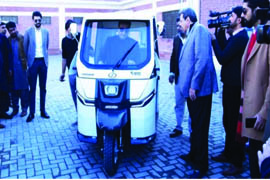 |
|
|
Coronavirus threat
There is no case of illness caused by 2019 novel Coronavirus (2019-nCoV) so far in Pakistan but it is a serious threat for Pakistan as air travel remains a major risk factor in its transmission to all parts of the world including Pakistan that is bordering China and having much transportation through road as well. The threat is greater because of working on CPEC and thousands of our students studying in China and their movement from China to Pakistan may bring the infection here. Chances cannot be ruled out that someone has already brought the infection to Pakistan.
Port Health Establishment guideline for combating coronavirus
Port Health Establishment, Government of Pakistan had issued series of guideline relating to preventive measures taken to counter coronavirus spread. In this connection it has been directed that; Maritime Declaration of Health, List of last 10 ports of call, Ship Sanitation Certificate, Declaration from the Captain about the health status of his own health and crew, and Vaccination List should be made available to authorities at least 24 hours before berthing of ship at Karachi, Qasim or Gwadar Port. Further, Immigration/FIA had been instructed not to issue shore leave pass to any crew member berthed at any port in Pakistan
|
 |
|
|
Govt in push for 12 more offshore oil and gas exploration blocks
Undeterred by the recent failure of the much hyped Kekra project, the Petroleum Division has sought security clearance of a dozen offshore blocks before inviting international oil and gas exploration and production companies for bidding. 12 exploration blocks in the deep and ultra-deep sea has been provided for security clearance. This clearance is a pre-requisite before offering any oil and gas exploration blocks to local or foreign exploration and production firms. Technically, an exploration block with a water depth of greater than 1,000 feet is described as deep and more than 5,000 feet is ultra-deep. Any exploration not more than 1,000 feet is called shallow. The government is currently working on processing about 17-18 exploration licences. Pakistan’s total sedimentary area was said to be of about 827,268 sq km and the area currently under exploration was 224,976 sq km. The total number of fuel discoveries made in the country stood at 394 with 85 of oil and 309 of gas, the success rate being about 34 per cent, according to the Petroleum Division. Last year in March, Prime Minister Imran Khan gave a go ahead for the creation of a dedicated security force for petroleum exploration in a bid to attract more and more companies for exploration and enhanced production of domestic oil and gas resources. However, progress could not be made on the creation of proposed special force.
|
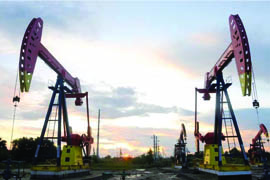 |
|
|
Foreign LNG firms to invest $500m without off-take guarantees
A parliamentary body on Wednesday, 2 Jan, was informed that international companies investing in liquefied natural gas (LNG) will bring in roughly $500 million foreign direct investment without any financial subsidy and off-take guarantees from the government which earlier placed unnecessary financial burden on the state. During the meeting of Standing Committee of National Assembly on Maritime Affairs, members inquired about the details of two new LNG terminals. Members were briefed that $10 million was being paid for the land alone. The basic premise of LNG imports over the past decade had been to reduce import bill through substitution of expensive furnace oil. Its introduction would also increase power sector efficiencies and lower carbon emissions. Members were also informed that the government was not giving any Rental and Regasification charges or any off take guarantee in any form for new LNG terminals. The committee members noted that the terms on which two new LNG terminals are being installed at Port Qasim were an excellent initiative by the Ministry of Maritime Affairs (MoMA). The members were also briefed about the ministry’s participation in the International Maritime Organisation (IMO)
|
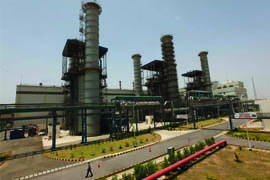 |
|
|
Japanese, Korean firms interested in Dhabeji SEZ
Japanese and Korean companies have jumped into the race of developing industrial zones in Pakistan alongside Chinese firms ahead of the expected relocation of some Beijing industries in the country. As many as 30 national and internationally reputed companies have shown keen interest to develop Dhabeji Special Economic Zone (SEZ), which is a project of the China-Pakistan Economic Corridor (CPEC) near Karachi at Dhabeji, said Sindh Special Economic Zones Management Company (SEZMC) Chief Executive Officer. SEZMC, which works under the umbrella of Investment Department Government of Sindh, had invited bids through national and international newspapers for selection as the developer of Dhabeji Special Economic Zone. In response 30 companies showed their interest, majority of which were Chinese firms working in Pakistan, he added. The government will facilitate the successful contender in gas, electricity and water connection or getting paperwork done quickly while the private developer would be obligated to bring private companies. The authorities are hopeful that the SEZ will get many Chinese firms that are labour intensive, to relocate, as the country is repositioning such industries to the neighboring countries of Pakistan. In this regard, the Sindh Investment Department has arranged a pre-bid meeting with all interested companies. Upon queries, the secretary investment informed that due to repeated demand of companies, the final date for the submission of bids has been extended to April 20 of this year.
|
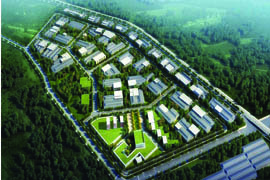 |
|
|
Swift implementation of KCR directed
Minister for Planning, Development and Special Initiatives has directed the Planning Division and the Economic Affairs Division (EAD) to immediately initiate work for finalising the implementation mechanism of the Karachi Circular Railway (KCR) project with the Chinese side. Chairing a meeting to discuss the KCR project, the minister reiterated that the federal government was fully committed to support the KCR project for its expeditious implementation in consultation with the China. He highlighted that the project would provide safe, efficient and reliable public transport for the citizens of Karachi. The meeting also discussed the issues hampering implementation of KCR project as indicated by the government of Sindh. The minister was given a detailed briefing on the project and was informed that PC-I of KCR project was approved in October 2017 by the Executive Committee of National Economic Council.
|
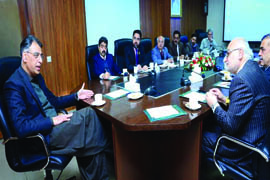 |
|
|
€250m ATT containers scanning project approved by PM
Prime Minister has approved a project costing €250 million to scan 100 per cent imported containers shipping goods under Afghan Transit Trade project. According to a Federal Board of Revenue senior officer, the project was planned under previous government’s tenure. However, the PM has approved the project in a special meeting on Sunday Jan 19, after which it would be initiated. The project would be completed in three phases by December 2020 and the pilot operation would kick off in April 2020. Under the project, special scanners would be installed at all crossing points and custom clearing stations used for trade, including Torkham and Chaman border. A special committee has been set up to prepare and forward the project’s PC-1 for approval. Under the project, special scanners would be installed at all border-crossing points and custom clearing stations to perform information technology integration. In the first phase of the project, three scanners would be installed at South Asia Pakistan Terminal Port (SAPT), Torkham and Chaman borders. Subsequently, four scanners at Karachi Port Terminal (KPT), one scanner each at Torkham and Chaman check points and two scanners at Gwadar port would be installed in the second phase of the project by June 2020. The third phase of the project would complete by December 2020 under which one scanner would be installed at each crossing point — Ghulam Khan, Kharlachi and Lahore — and two scanners would be installed at Sust border.
|
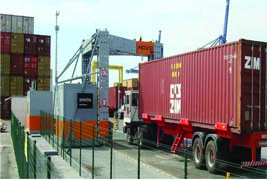 |
|
|
Pakistan begins exporting furnace oil
Pakistan, which is a leading oil importing country, has become an exporter of furnace oil as a prominent refinery’s ship loaded with the fuel is scheduled to leave Karachi Port early in the morning on Tuesday Jan 21. The government has bailed out the outdated refineries, but only for a period of two months. It has resumed power production from the oil-fired plants to let the overflowing refineries overcome the furnace oil supply glut. “After February 28, the government will not take any responsibility for furnace oil and companies (refineries) will deal with it by themselves,” an official at the Petroleum Division told the news men. An official at the Karachi Port Trust (KPT) confirmed “oil tanker Roy Maersk is currently being loaded with furnace oil.” The Petroleum Division official said late last week “refineries’ stocks were piled up to the level of 105,000 tons in December 2019, which have now been reduced to 40,000 tons due to furnace oil consumption by power producers.”
|
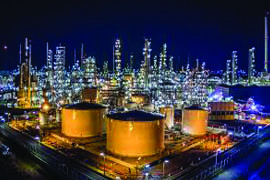 |
|
|
Lahore among the ‘safest cities’ in the world
With an improvement of 56 ranking places, Lahore, the seat of government in Punjab, is even safer than Paris, New York, Berlin and Chicago on the World Crime Index (WCI), according to a survey conducted by Numbeo. Numbeo is a crowd-sourced global database of reported consumer prices, perceived crime rates, and quality of healthcare, among other statistics. Lahore was ranked 230th out of a total 374 cities of the world in the Numbeo’s survey for Jan 2020. It was placed at 174 in Jan 2019 and moved to 202 with an improvement of 28 places in mid-2019. An increase in a city’s ranking means a drop in its crime rate.
|
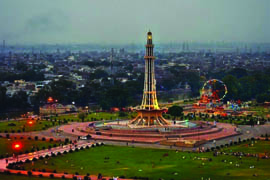 |
|
|
PIA offers rail service to passengers going to western states
Pakistan International Airlines (PIA) has diversified its operations from air travel to railway service for the passengers flying to select western countries – the UK, Spain, Norway and Canada. “PIA has announced a new partnership with AccesRail, the world’s leading provider of air-rail intermodal solutions,” said PIA spokesperson. The partnership will allow PIA to use AccesRail’s expertise to enable its customers book train tickets in the UK, Spain, Norway and Canada by using PIA’s booking platform or through travel agent Global Distribution System. The airline has arranged code-sharing with the company, which will take PIA passengers to their next destinations after departing from the airport. This new arrangement, according to the spokesperson, provides convenient and easy rail/bus connections at PIA’s key gateways in the UK, Europe and Canada, enabling passengers to reach cities and destinations other than those served by PIA and to reach end-destinations seamlessly with the best fares available as per desired itinerary and the same ticket.
|
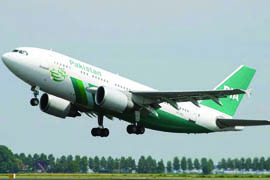 |
|
|
Unutilised water flow into sea causes $29bn yearly loss to economy: Irsa
Pakistan is facing about $29 billion in economic losses every year on account of unutilised flow of river waters into the sea due to limited water storage capacity. “We and our coming generations would die of hunger if we do not build dams,” Member Punjab of the Indus River System Authority (Irsa), told the Senate Standing Committee on Water Resources on Tuesday Jan 17. The meeting was presided over by Senator Mohammad Yousuf Badini. The committee ordered completion of the process to award by June the contract for establishment of the telemetry system for accurate reporting of water flows and immediate appointment of Irsa’s member from Balochistan. Coming generations will die of hunger if dams not built, Senate panel warned. Irshad Khan told the committee that one million acre feet (MAF) water on average irrigated four million acres of land and the economic value of 1MAF water was estimated at $1bn. He said that about 29MAF water on average was going downstream Kotri — the last structure on the Indus system for water regulation — and falling into the Arabian Sea every year. “We can save this water by increasing storage capacity and bring virgin land under cultivation, but unfortunately this has been going down the drain since 1976,” he said, adding: “Our population is increasing day by day and if we keep losing, the day is not far off when people would be on roads due to hunger. We will die of hunger. Our future generations will die of hunger without additional dams.” of the canal was only 14,000 cusecs. He said Sindh had serious reservations over the redesigning of Greater Thal Canal (GTC) because any development in the upstream of the Indus system would affect the downstream irrigation.
|
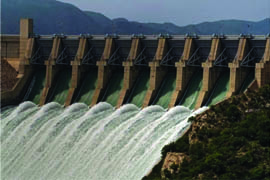 |
|
|
Hyundai-Nishat begins truck production
Hyundai-Nishat Motor Company on Wednesday Jan 15, started commercial production of light trucks at its assembly plant in Faisalabad. This news comes at a time when automobile sales in the country are rapidly plummeting amid stabilisation policies being pursued by the government under the $6 billion International Monetary Fund programme. The company, which plans to launch three locally assembled Hyundai passenger cars -- each every six months from June, expects to run one shift over the next few months in view of the depressed domestic auto sales, rolling out only 20-25 units of its light trucks a day.
According to the latest published data from the Pakistan Automotive Manufacturers Association (Pama), the car sales declined by 43.2 per cent to 59,097 units in the first half of 2019, from 104,038 units from same period last year. Nishat Group has partnered with Millat Tractors and Soljitz Corporation of Japan to invest Rs19 billion to assemble Korean cars and light trucks at its manufacturing facility spread over 67 acres.
|
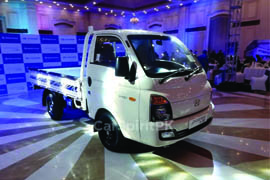 |
|
|
Bumpy ride ahead for automakers
Following a drop of up to 72 per cent in automobile sales in the first half of 2019-20, stakeholders in the auto sector say dark clouds will likely continue hovering over the sector in January-June. Issues like high prices on account of the federal excise duty ranging from 2.5pc to 7.5pc on engines of different horsepower, additional customs duty on raw material imports, record high interest rates and strict vigilance by the Federal Board of Revenue (FBR) still persist. However, January and February are considered better months for sales. People resume buying after suspending their purchases in November and December in anticipation of a change in model. The first half of 2019-20 also saw non-production days (NPDs) at many assembling units followed by plant shutdowns for longer durations, especially in tractor units. Unsold inventories piled up at plants and dealerships, forcing a large number of workers in the auto-part industry to stay out of work. The government did not play any role in checking multiple price increases by car and bike assemblers. The frequent price hikes were justified on account of the dropping value of the rupee against the dollar, which nullifies the assemblers’ claim about higher localisation. Although the exchange rate finally reverted to Rs155 after swelling to Rs164 in June 2019, car and bike prices continued to rise. ‘Nobody wants to go for expansion because of poor economic and political conditions’ Greenfield and brownfield investors who put in over $1 billion under the Auto Development Policy 2016-21 are also operating in an unfriendly business environment amid depressed demand. Under Category A, 18 investors have been granted the greenfield status since 2016. Two closed-down units have also been revived under the brownfield status. Regal Automobiles, United Motors, Master Motors, JW Foreland, Kia Lucky Motors and Hyundai Nishat Motors have already started car and SUV production.
|
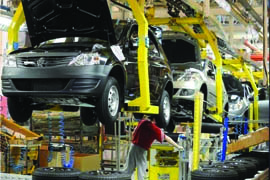 |
|
|
Govt to import 0.3m tonnes of wheat to overcome flour shortage
The Economic Coordination Committee (ECC) gave approval to import 300,000 tonnes of wheat to curtail supply shortage and increased prices. The centre has asked the Punjab government and Pakistan Agricultural Storage and Services Corporation (PASSCO) to release their stocks to overcome the shortage. The first shipment is expected to arrive by February 15 whereas the wheat imports would be allowed in the country till March 31. A day earlier, Prime Minister Imran Khan ordered a countrywide “grand operation” against wheat hoarders and profiteers after “acute flour shortages” ballooned into a crisis, shooting the prices up by as much as Rs6 per kilo and catching the government off guard. Alarmed by the sudden upsurge in prices, Imran Khan directed the four provincial chief secretaries to launch a “grand operation” to net wheat hoarders and seal their granaries, according to his office. The top provincial administrators have been directed to initiate operations at the district level. This is the second time the flour price has gone up as earlier the rates were jacked up by Rs20 per kilo. Though the earlier price upsurge was not unexpected, the current crisis, the government believes, is artificial, created by hoarders in an attempt to mint money. Interestingly, the prime minister only on Jan 16 approved a multibillion-rupee package for providing relief to the poor through the Utility Stores Corporation (USC). Under the package, the government plans to lower the prices of kitchen items – including flour, cooking oil, rice and pulses, etc – for the poor segment of society. The prime minister had said that the national economy is on the mend and that 2020 would the year of stabilisation and prosperity. The government has been subjected to scathing vitriol by the opposition over the flour price hike with the PPP-led Sindh government faulting the Centre for “this tsunami of dearness”, while traders blaming smuggling of the commodity to Afghanistan for the shortages.
|
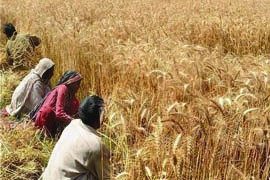 |
|
|

© 2020 Alpine Marine Services Pvt Ltd.,
All rights reserved
|
|